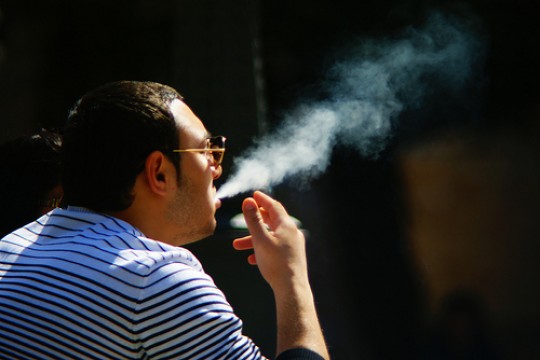Study suggests smoking may cause the body to turn against its own helpful bacteria
Study suggests smoking may cause the body to turn against its own helpful bacteria

Add this to your list of reasons to kick your cigarette habit: Recent research shows smoking may cause the body to turn against helpful bacteria leaving people who smoke more vulnerable to disease.
In the small study (subscription required), Ohio State University researchers took samples of oral biofilm from health non-smokers and healthy smokers one, two, four and seven days after receiving a professional cleaning. By analyzing DNA signatures found in dental plaque, researchers determined which bacteria were present and then monitored whether participant’s bodies were treating the microbes as a threat. According to a university release:
The team found that for nonsmokers, bacterial communities regain a similar balance of species to the communities that were scraped away during cleaning. Disease-associated bacteria are largely absent, and low levels of cytokines show that the body is not treating the helpful biofilms as a threat.
“By contrast,” said [Ohio State researcher Purnima Kumar, PhD,] “smokers start getting colonized by pathogens – bacteria that we know are harmful – within 24 hours. It takes longer for smokers to form a stable microbial community, and when they do, it’s a pathogen-rich community.”
Smokers also have higher levels of cytokines, indicating that the body is mounting defenses against infection. Clinically, this immune response takes the form of red, swollen gums – called gingivitis – that can lead to the irreversible bone loss of periodontitis.
In smokers, however, the body is not just trying to fight off harmful bacteria. The types of cytokines in smokers’ gum swabs showed the researchers that smokers’ bodies were treating even healthy bacteria as threatening.
Researchers say the findings could shape dental care practices for patients who smoke and motivate dentists to play a more active role in helping patients get the necessary support to kick their nicotine habit.
By Lia Steakley
Stanford University Medical Center
Photo by LawPrieR
###
* Stanford University Medical Center integrates research, medical education and patient care at its three institutions – Stanford University School of Medicine, Stanford Hospital & Clinics and Lucile Packard Children’s Hospital.
** The above story is adapted from materials provided by Stanford University School of Medicine
________________________________________________________________


















